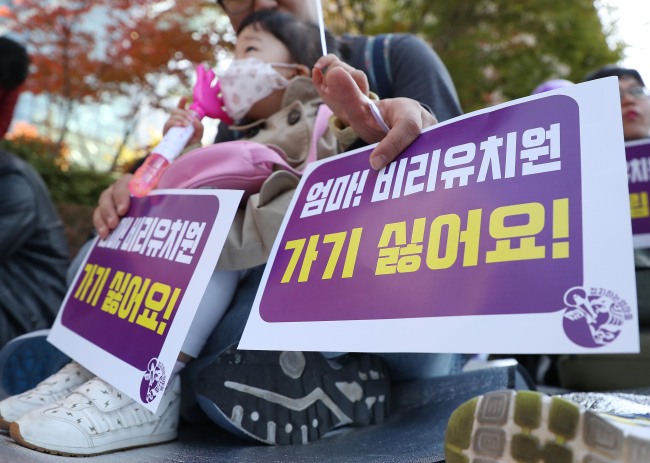A conflict between public and private kindergartens is deepening following a lawmaker’s revelations of thousands of cases of accounting fraud by private kindergartens.
As the Education Ministry and government are moving to introduce stronger measures to monitor the private institutes, the kindergartens are lashing back, announcing a move to not admit new students.
The Education Ministry is to open the results of all past inspections of private kindergartens that took place from 2013 to 2017 on Thursday, and reveal the names of institutes found to have committed accounting fraud.
As the Education Ministry and government are moving to introduce stronger measures to monitor the private institutes, the kindergartens are lashing back, announcing a move to not admit new students.
The Education Ministry is to open the results of all past inspections of private kindergartens that took place from 2013 to 2017 on Thursday, and reveal the names of institutes found to have committed accounting fraud.

The ministry, presidential office and ruling Democratic Party of Korea will also hold a meeting and announce comprehensive measures to revise the kindergarten law and introduce a new monitoring system for private kindergartens, on the same day.
Rep. Park Yong-jin of the Democratic Party revealed early this month that 5,951 financial irregularities had occurred at 1,878 private kindergartens from 2014 to 2017, sparking public uproar. In one case disclosed by Rep. Park, a principal of a private kindergarten in Gyeonggi Province was sacked in January for spending tuition fees for private purposes, such as buying a designer handbag and paying for hotels and adult goods.
More than 130 cases of irregularities at private kindergartens were reported to the Education Ministry’s corruption report center in the first four days of its operation, according to the ministry.
Following the ministry’s actions, some private kindergartens said they would not accept applications from prospective students for next year. The Korea Kindergarten Association also criticized the government and the lawmaker, saying that disclosing the list of kindergartens that were inspected has misled the public into thinking all private kindergartens are corrupt.
“Only about 4 percent of the irregularities that were discovered constitute serious accounting fraud. The rest are trivial administrative errors,” Lee Deok-sun, the head of the association, said in a radio interview on Monday.
“The land and building the kindergartens are using are all private property, and we pay property tax. We have been demanding appropriate financial accounting regulations for the past decade.”
The fact that the private institutes receive government funding has triggered calls for state inspections.
According to the Education Ministry, about 8 in 10 children attend private kindergartens, even though state and public kindergartens make up about half of the 9,000 kindergartens in the country.
To lessen the burden on parents, the Education Ministry launched the Nuri Program in 2013. The Nuri Program is a free child care program for children aged 3 to 5. For private kindergartens, the government provides a monthly subsidy of 220,000 won ($194) and an additional 70,000 won for after-school activities. Parents need to apply for the subsidies, but the money is given directly to the private kindergartens.
But the government funds were categorized as “support funds,” not “state subsidies.” Otherwise, they would have been required to document all expenses. The government is now also expected to reorganize categories for its subsidies and support funds and to mandate auditing of private kindergartens.
Experts say it is hard to claim that all private institutes have committed irregularities “unethically.” For instance, there is no law mandating how private kindergartens are run, as they are ultimately private businesses, Park Chang-hyun, a researcher at the Korea Institute of Child Care and Education, told The Korea Herald.
“Basically, it is a clash of public legal responsibility (for kindergartens) as an education body and rights of private businesses. While the kindergartens are categorized as ‘schools,’ many of the operators are individuals,” she said.
While state and public kindergartens are regulated under the Kindergarten Act, private kindergartens are subject to the Private School Act, and are monitored by the metropolitan and provincial education offices across the nation.
“The government sought to expand education for infants and young children in the 1980s, but did not have much budget and passed the duty to the private sector,” Park said.
Since more than 70 percent of private kindergarten operators are individual business owners, Park said it is crucial to have the institutes incorporated.
“The government should either have some kind of an exit route for the individual businesses, or find ways for them to be incorporated,” Park said.
Under the Private School Act, private kindergartens are also banned from altering their status from school to private education body without permission.
By Jo He-rim (herim@heraldcorp.com)








![[KH Explains] How should Korea adjust its trade defenses against Chinese EVs?](http://res.heraldm.com/phpwas/restmb_idxmake.php?idx=644&simg=/content/image/2024/04/15/20240415050562_0.jpg&u=20240415144419)











![[Today’s K-pop] Stray Kids to return soon: report](http://res.heraldm.com/phpwas/restmb_idxmake.php?idx=642&simg=/content/image/2024/04/16/20240416050713_0.jpg&u=)